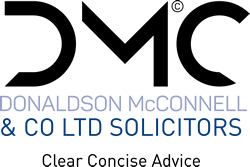Unfortunately, there’s a time in almost everyone’s life when they find themselves in dispute with someone else. At DMC we know that there a numerous ways to resolve disputes or to prevent an issue becoming contentious from the outset. It is our belief that it’s important to set the correct tone from the outset and that you should seek advice as soon as possible.
Dispute Resolution / Mediation
You should contact us for a free initial consultation if you are having any issues in relation to:-

'Dispute Resolution / Mediation' Specialist
Contact Adam on
02892 601421
DMC undertake two major types of dispute resolution.
- Adjudicative processes (such as litigation) where proceedings are brought before a court or tribunal and the issues in dispute are ultimately decided by a judge. DMC have extensive experience in a wide range of courts and tribunals.
- Consensual or collaborative processes such as mediation or negotiation, in which the parties attempt to reach agreement, often with the assistance of an independent third party at more informal meetings. DMC realise the benefit to early and cost effective settlements. We’re here to serve our client’s needs – not to increase their costs through unnecessary or protracted litigation.

Mediation
DMC genuinely believe that mediation often offers a viable alternative to court.
Adam Spence is a trained mediator and member of the Law Society of Northern Ireland’s Dispute Resolution Service and can advise you on all aspect of undertaking mediation. Mediation involves an independent mediator being appointed by the parties to assist them in reaching a resolution.
The advantages of mediation over court proceedings are:
- It is usually quicker, reducing stress on the parties and allowing business disputes to be resolved more quickly;
- It is much cheaper than litigation and can often be undertaken by the parties and their solicitors without the need for barristers, experts or court fees;
- The parties will reach an agreement rather than a court or judge imposing a decision; on this basis the parties will feel that they have had a direct influence on the outcome;
- The parties work together with the mediator to find a solution. It is therefore much less confrontational or adversarial than court and it negates the need for parties to give evidence and be cross examined;
- It is a flexible, confidential and undertaken on a without prejudice basis. It does not exclude the parties from advancing to court but it does allow for solutions to be found which might not be open to the court or which may not have occurred to the parties or their advisors previously.
Contact us today for an initial consultation to discuss how we can help you resolve a dispute with as little stress as possible in the most cost effective and productive way available to you.
